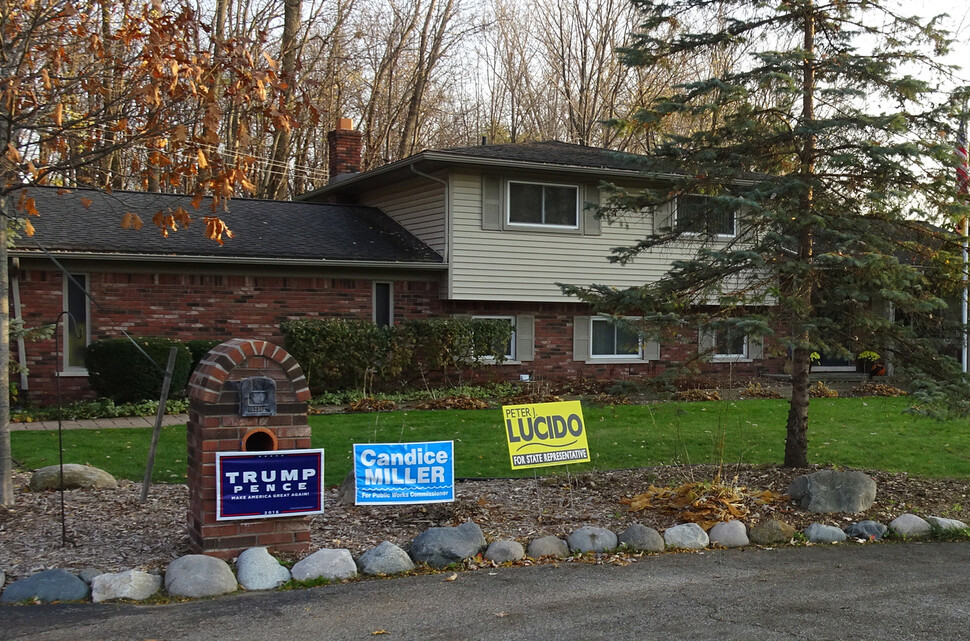hankyoreh
Links to other country sites 다른 나라 사이트 링크
[Correspondent’s column] Anger in Michigan, Bernie Sanders and the American zeitgeist

Shortly after the US presidential election, I visited Michigan, where the factories of the “big three” automakers are located. Michigan is part of the rust belt, regarded as the last firewall for Democratic candidate Hillary Clinton. But while Michigan was supposed to be an impregnable fortress for the Democrats, it was captured by Republican candidate Donald Trump.
I really should have visited earlier. I had been so focused on the battleground states of Florida and North Carolina that I completely ignored Michigan. Even so, hearing the thoughts of the white factory workers who are so dominant here made me want to reassess the election. I had quite a few long conversations with supporters of Donald Trump and Bernie Sanders whom I met in restaurants near their factories, in coffee shops, in front of their homes and over a beer.
I’m going to try answering a few questions here. The first one is whether the anger that factory workers (including Sanders’ supporters) feel for free trade is justified. I believe that it is. I couldn’t bring myself to tell them that their factories closed because the automobiles, televisions and washing machines they made weren’t competitive.
The South Korean government’s focus on the manufacturing sector in the 1990s turned rural areas in South Korea into economic wastelands where you couldn’t even hear a baby crying. But no one was about to criticize the farmers for being incompetent or uncompetitive. If an overhaul of the industrial structure is unavoidable, I believe that the government that implements that overhaul and the industries that benefit from it ought to pick up the slack.

As the US reoriented its economy around financial firms on Wall Street, it threw the manufacturing sector under the bus. This trend only became starker after the financial crisis in 2008. Trump and Sanders supporters’ opposition to Wall Street and the political establishment was a warning about government and corporate negligence. These feelings also manifested in opposition to Clinton.
The second question is whether white supremacy played a role in Trump’s election, given the gradual erosion of whites’ dominance over American society. Of course it has.
“The suburbs of Detroit aren’t safe,” said a Trump supporter whom I met in a restaurant in front of a Ford factory in Macomb County. “Families don’t have men to look after them, and the kids get into trouble.” When I asked why there aren’t any men in those families, the man quickly looked around and then said in a lower voice, “That’s just how black culture is.” I could feel his disdain for blacks.
In the US, it’s not possible to completely eradicate racial issues. Reducing conflict is the best outcome, and keeping it from increasing is a decent alternative. When the US becomes more prosperous, racial conflict decreases, while hard times tend to amplify those divisions. Since feelings of relative deprivation are increasing because of income inequality, it’s unlikely that racial tension will relax for the time being. And since Trump rubbed salt in the wounds of racial conflict during his campaign, the cliquish behavior of whites who are obsessed with their own superiority and with their fear of ethnic minorities is likely to get even worse.

The third question is whether American voters will continue asking for an isolationist foreign policy. I think that they will.
“Considering how long it’s been since the end of World War II and the Korean War, do we still have to be the world’s police with troops stationed in South Korea, Japan and Germany? The world has changed, and even Americans are aware that you can’t run the country like that anymore,” said a worker at a Chrysler factory. The opinions I heard could be summarized as follows: we don’t want to worry about other countries’ problems, but if you mess with us, you’re dead meat.
Looking back over the US presidential election over the past year and a half, there was one person who criticized Wall Street’s monopoly on profits while advocating workers’ rights. He endorsed the feelings of minorities under the progressive banner of diversity and advocated peace despite being criticized as an idealist. While he sometimes made mistakes on the campaign trail, in the end I can’t help thinking that Sanders, the senator from Vermont, may represent the American zeitgeist.
By Yi Yong-in, Washington correspondent
Please direct questions or comments to [english@hani.co.kr]

Editorial・opinion
![[Guest essay] Maybe Korea’s rapid population decline is an opportunity, not a crisis [Guest essay] Maybe Korea’s rapid population decline is an opportunity, not a crisis](https://flexible.img.hani.co.kr/flexible/normal/500/300/imgdb/original/2024/0430/9417144634983596.jpg) [Guest essay] Maybe Korea’s rapid population decline is an opportunity, not a crisis
[Guest essay] Maybe Korea’s rapid population decline is an opportunity, not a crisis![[Column] Can Yoon steer diplomacy with Russia, China back on track? [Column] Can Yoon steer diplomacy with Russia, China back on track?](https://flexible.img.hani.co.kr/flexible/normal/500/300/imgdb/original/2024/0430/1617144616798244.jpg) [Column] Can Yoon steer diplomacy with Russia, China back on track?
[Column] Can Yoon steer diplomacy with Russia, China back on track?- [Column] Season 2 of special prosecutor probe may be coming to Korea soon
- [Column] Park Geun-hye déjà vu in Yoon Suk-yeol
- [Editorial] New weight of N. Korea’s nuclear threats makes dialogue all the more urgent
- [Guest essay] The real reason Korea’s new right wants to dub Rhee a founding father
- [Column] ‘Choson’: Is it time we start referring to N. Korea in its own terms?
- [Editorial] Japan’s rewriting of history with Korea has gone too far
- [Column] The president’s questionable capacity for dialogue
- [Column] Are chaebol firms just pizza pies for families to divvy up as they please?
Most viewed articles
- 1Months and months of overdue wages are pushing migrant workers in Korea into debt
- 2[Guest essay] Maybe Korea’s rapid population decline is an opportunity, not a crisis
- 3Dermatology, plastic surgery drove record medical tourism to Korea in 2023
- 4Under conservative chief, Korea’s TRC brands teenage wartime massacre victims as traitors
- 5First meeting between Yoon, Lee in 2 years ends without compromise or agreement
- 6[Column] Can Yoon steer diplomacy with Russia, China back on track?
- 7[Editorial] Japan’s rewriting of history with Korea has gone too far
- 8[Editorial] When the choice is kids or career, Korea will never overcome birth rate woes
- 9“Korea is so screwed!”: The statistic making foreign scholars’ heads spin
- 10[Column] Why Korea’s hard right is fated to lose